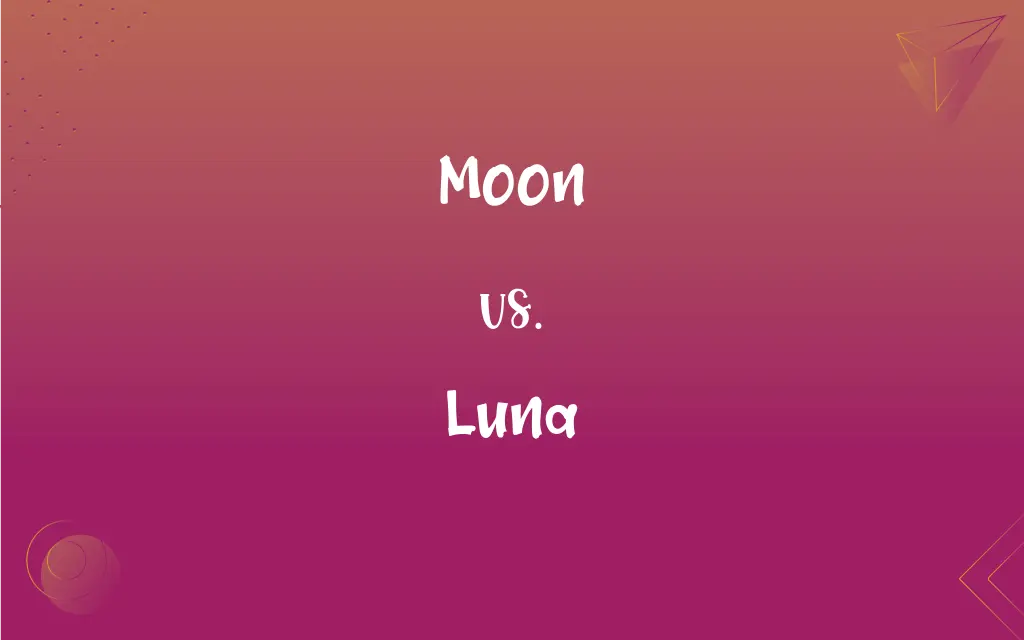Moon vs. Luna: What's the Difference?
Edited by Aimie Carlson || By Harlon Moss || Updated on November 7, 2023
"Moon" is Earth's natural satellite, while "Luna" is its Latin name, also used poetically and in astronomy.

Key Differences
The moon is a celestial body that orbits Earth and is visible by reflected sunlight, whereas luna is simply the Latin and Italian term for the same entity. In everyday English, "moon" is the most commonly used term, while "luna" is often used in a more poetic or astronomical context. "Moon" can also refer to any natural satellite orbiting another planet, but "luna" is specifically associated with Earth's moon.
The word "moon" is integrated into the English language and appears in many idiomatic expressions, such as "once in a blue moon," indicating rarity. Conversely, "luna" does not feature commonly in colloquial phrases and is often reserved for scientific, literary, or certain branding purposes. The moon goes through phases, waxing and waning from new to full, a process that fascinates many cultures, which have named each full moon differently. In contrast, "luna" does not carry these cultural connotations and is less involved in folklore.
In discussing lunar geography, "moon" is the word of choice, with features like seas (maria) and craters named by astronomers. "Luna," however, is sometimes used in the names of spacecraft and missions that study the moon, like NASA's Lunar Reconnaissance Orbiter sometimes being referred to as a lunar orbiter. The moon's influence on Earth includes effects on tides, ecosystems, and possibly human behavior, a subject of much discussion and study. "Luna," while referring to the same object, is less often invoked in such discussions, remaining more a term of art and science.
The moon is an integral part of Earth's history and has inspired countless myths, legends, and calendars throughout human history. "Luna" carries a certain classical gravitas, often chosen for its romantic or scholarly undertones when naming or describing lunar-related phenomena. The exploration of the moon has been a significant part of space exploration, with "moon" being the term used in historical records of space travel. "Luna" might be used to evoke a sense of the ancient or the timeless, in discussions of the same explorations.
Comparison Chart
Usage
Common English term
Latin term, used in specific contexts
ADVERTISEMENT
In Phrases
Appears in idiomatic expressions
Rarely used in colloquial phrases
Cultural Connotation
Associated with folklore and myths
Less culturally connotative, more scientific
Astronomical Missions
Commonly used to name missions (e.g., Apollo)
Used in some mission names (e.g., Luna program)
Romanticism
Used more factually
Often used for poetic or romantic allusions
Moon and Luna Definitions
Moon
Earth's only natural satellite, reflecting sunlight.
The moon looks stunning during the full moon phase.
ADVERTISEMENT
Luna
A female given name or a character name in literature and mythology.
Luna is a popular name in many fantasy novels.
Moon
Any natural satellite of a planet.
Jupiter has 79 moons, each with its unique characteristics.
Luna
Used in names of missions to the moon, like the Soviet Luna program.
Luna 2 was the first spacecraft to reach the moon's surface.
Moon
A month, especially a lunar month.
He'll return from his trip in a moon.
Luna
Another name for Earth's moon in Latin and Italian.
The luna's surface is covered with dust and rocky debris.
Moon
To expose one's buttocks as a prank or insult.
The rowdy students decided to moon the passing cars.
Luna
A prefix in compound words related to the moon, like "lunatic," historically believed to be affected by the moon.
The term lunatic originates from the belief in the moon's influence on mental stability.
Moon
To act in a dreamy, distracted manner.
She was mooning over her new book all afternoon.
Luna
Used in artistic or brand names to evoke mystique and nighttime beauty.
The gallery's new exhibit, Luna, explores the moon's influence on art.
Moon
Often Moon The natural satellite of Earth, visible by reflection of sunlight and having a slightly elliptical orbit, approximately 363,100 kilometers (225,600 miles) distant at perigee and 405,700 kilometers (252,100 miles) at apogee. Its mean diameter is 3,475 kilometers (2,159 miles), its mass approximately one eightieth that of Earth, and its average period of revolution around Earth 29 days 12 hours 44 minutes calculated with respect to the sun.
Luna
The goddess of the moon.
Moon
A natural satellite revolving around a planet.
FAQs
Can "moon" refer to other planets' satellites?
Yes, "moon" can describe any natural satellite orbiting a planet.
What's a blue moon?
A blue moon is the second full moon in a calendar month, a rare event.
Do "moon" and "luna" refer to the same thing?
Yes, they both refer to Earth's natural satellite.
Does the moon have an atmosphere?
The moon has an exosphere, which is a very thin atmosphere.
What does luna mean?
Luna is the Latin name for the moon, used in poetic and astronomical contexts.
Why is "luna" used in spacecraft names?
"Luna" is often chosen for its classical and scholarly connotations.
What is the moon?
The moon is Earth's natural satellite, visible by reflected sunlight.
Is "luna" commonly used in everyday language?
No, "luna" is less common and is mostly used in scientific or literary contexts.
Does the moon rotate?
Yes, the moon rotates on its axis, showing us the same face due to synchronous rotation.
Is "luna" used in language other than English?
Yes, "luna" is also the word for moon in several Romance languages.
Are there water on the moon?
Yes, water ice has been found in permanently shadowed lunar craters.
Is the moon important to Earth?
Yes, it affects tides, ecosystems, and has cultural significance.
How does the moon's phase cycle work?
The moon's phases are the result of its orbit around Earth, showing us more or less of the sunlit side.
Is "luna" used in science?
"Luna" is used in scientific Latin and sometimes in astronomical contexts.
What does "lunatic" mean?
Historically, "lunatic" referred to someone believed to be affected by the moon's phases, now an outdated term for insanity.
Are "luna" and "lunar" the same?
"Luna" is the name; "lunar" is the adjective relating to the moon.
Does "luna" have any poetic significance?
Yes, "luna" is often used in poetry to evoke the moon's beauty and mystery.
Was Luna a goddess?
Yes, Luna was the Roman goddess of the moon.
Can the moon appear during the day?
Yes, the moon can often be seen in the daytime sky.
Are moonquakes real?
Yes, moonquakes are tremors on the moon's surface, similar to earthquakes.
About Author
Written by
Harlon MossHarlon is a seasoned quality moderator and accomplished content writer for Difference Wiki. An alumnus of the prestigious University of California, he earned his degree in Computer Science. Leveraging his academic background, Harlon brings a meticulous and informed perspective to his work, ensuring content accuracy and excellence.
Edited by
Aimie CarlsonAimie Carlson, holding a master's degree in English literature, is a fervent English language enthusiast. She lends her writing talents to Difference Wiki, a prominent website that specializes in comparisons, offering readers insightful analyses that both captivate and inform.































































